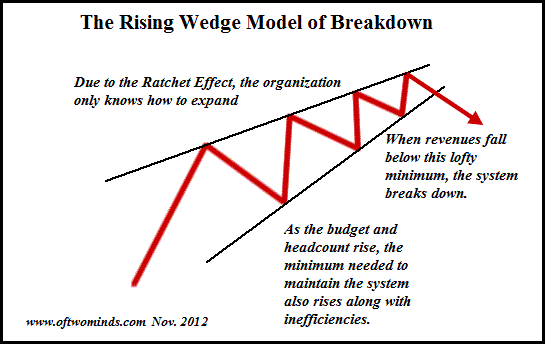Call it cultural synchronicity, but it increasingly feels like we're living in the 1979 Talking Heads song Life During Wartime, which was anchored by the lyric "This Ain't No Party, This Ain't No Disco, This Ain't No Foolin' Around." Indeed.
It also feels like Life During Wartime because the propaganda is so blatant and intense: we're winning the war on Covid-19, and our wars on everything else, too, of course, as war is the favored metaphor and favored policy at the end of the Empire.
The ceaseless propaganda is that "a vaccine is right around the corner." The inconvenient reality is that Corporate Insiders Pocket $1 Billion in Rush for Coronavirus Vaccine: Well-timed stock bets have generated big profits for senior executives and board members at companies developing vaccines and treatments.
In other words, wartime profiteering isn't just allowed, it's encouraged--yet another sign that we're in the final decay/collapse phase of Imperial Pretensions.
It's easy to mix up the propaganda and the counter-propaganda, because they're both so extreme. There is no middle ground, only pre-packaged positions which dictate which "data" is cherry-picked to support the political partisanship that's being defended.
Is Data Our New False Religion? (June 23, 2020)
In a world of thousands of unread papers published in hundreds of scientific journals no one even reads and a corrupt culture of "science for sale," there's a veritable orchard to cherry-pick.
"Robert Horton, editor in chief of The Lancet, one of the most respected professional peer reviewed publications in the world dealing with biomedical research had this to say in an editorial published by The Lancet in April of 2015:"
"The case against science is straightforward: much of the scientific literature, perhaps half, may simply be untrue. Afflicted by studies with small sample sizes, tiny effects, invalid exploratory analyses, and flagrant conflicts of interest, together with an obsession for pursuing fashionable trends of dubious importance, science has taken a turn towards darkness."
source: What is medicine's 5 sigma?
"And this, published in 2009, by Dr. Marcia Angell, former editor of The New England Journal of Medicine, another world leading publication in medical research:"
"It is simply no longer possible to believe much of the clinical research that is published, or to rely on the judgment of trusted physicians or authoritative medical guidelines. I take no pleasure in this conclusion, which I reached slowly and reluctantly over my two decades as an editor of The New England Journal of Medicine."
Skeptical of medical science reports? (ncbi.nlm.nih.gov)
Metaphorically speaking, the civilian populace believes "we're winning" until the bombs start dropping on their homes. For some reason, this doesn't feel like "winning."
The V-shaped recovery is the propaganda war the status quo must win, for this is the narrative battle for the hearts and minds of the populace. The fear here is that should the populace lose confidence in The V-shaped recovery, they might reduce their borrowing and spending and increase their saving, dooming an economy that depends entirely on marginal spending funded by debt to keep from imploding.
As the chart of the rising wedge model of breakdown below illustrates, when big-ticket costs ratchet higher like clockwork--rent, property taxes, childcare, higher education, debt, healthcare, etc.-- while income stagnates for the bottom 90%, any drop in spending, no matter how modest, breaks the system because any reduction in spending reduces tax revenues, corporate profits and debt payments below the critical threshold.
This is why the Federal Reserve is so keen on bailing out bankrupt-in-all-but-name corporations and banks: The laughably hopeless hope is that by propping up the corpses, the populace will discern some faint flicker of life in the decaying carcasses and return to their free-spending ways.
This is also why "stimulus" is being scattered from helicopters: the hope is that by substituting borrowed trillions for earned trillions, people will substitute magical thinking for clear-eyed recognition that the era of "growth" has transitioned into the era of DeGrowth, a state of affairs that signals the demise of all the bloated, sclerotic institutions operated to benefit insiders and Corporate America's cartels and monopolies: the most protected bastions of the era, colleges and hospitals, are going broke and closing.
As Marx noted, "everything solid melts into air" when it's no longer financially viable. Helicopter "stimulus" just creates a temporary illusion of solidity.
And then there's the immense profitability of Big Tech pushing propaganda, partisanship, anger and indignation: If you're not terrified about Facebook, you haven't been paying attention.
The foundations are collapsing, but by all means, please keep your eye on the decaying corpses: didn't an eyelid flicker in that one? I could swear that one moved its foot...
This is "life in wartime," where the battles are waged in narratives, confidence and magical thinking.

Commenti
Posta un commento